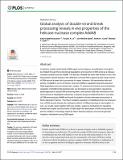| dc.contributor.author | Badrinarayanan, Anjana | |
| dc.contributor.author | Le, Tung | |
| dc.contributor.author | Spille, Jan Hendrik | |
| dc.contributor.author | Cisse, Ibrahim I | |
| dc.contributor.author | Laub, Michael T | |
| dc.date.accessioned | 2018-01-19T15:42:46Z | |
| dc.date.available | 2018-01-19T15:42:46Z | |
| dc.date.issued | 2017-05 | |
| dc.date.submitted | 2016-10 | |
| dc.identifier.issn | 1553-7404 | |
| dc.identifier.issn | 1553-7390 | |
| dc.identifier.uri | http://hdl.handle.net/1721.1/113234 | |
| dc.description.abstract | In bacteria, double-strand break (DSB) repair via homologous recombination is thought to be initiated through the bi-directional degradation and resection of DNA ends by a helicase-nuclease complex such as AddAB. The activity of AddAB has been well-studied in vitro, with translocation speeds between 400–2000 bp/s on linear DNA suggesting that a large section of DNA around a break site is processed for repair. However, the translocation rate and activity of AddAB in vivo is not known, and how AddAB is regulated to prevent excessive DNA degradation around a break site is unclear. To examine the functions and mechanistic regulation of AddAB inside bacterial cells, we developed a next-generation sequencing-based approach to assay DNA processing after a site-specific DSB was introduced on the chromosome of Caulobacter crescentus. Using this assay we determined the in vivo rates of DSB processing by AddAB and found that putative chi sites attenuate processing in a RecA-dependent manner. This RecA-mediated regulation of AddAB prevents the excessive loss of DNA around a break site, limiting the effects of DSB processing on transcription. In sum, our results, taken together with prior studies, support a mechanism for regulating AddAB that couples two key events of DSB repair–the attenuation of DNA-end processing and the initiation of homology search by RecA–thereby helping to ensure that genomic integrity is maintained during DSB repair. | en_US |
| dc.description.sponsorship | National Institutes of Health (U.S.) (Grant 5R01GM082899) | en_US |
| dc.description.sponsorship | Human Frontier Science Program (Strasbourg, France) (Postdoctoral Fellowship) | en_US |
| dc.description.sponsorship | Gordon and Betty Moore Foundation (Postdoctoral Fellowship of the Life Sciences Research Foundation) | en_US |
| dc.description.sponsorship | Massachusetts Institute of Technology (RSC Grant 2654055) | en_US |
| dc.publisher | Public Library of Science (PLoS) | en_US |
| dc.relation.isversionof | http://dx.doi.org/10.1371/JOURNAL.PGEN.1006783 | en_US |
| dc.rights | Creative Commons Attribution 4.0 International License | en_US |
| dc.rights.uri | http://creativecommons.org/licenses/by/4.0 | en_US |
| dc.source | PLoS | en_US |
| dc.title | Global analysis of double-strand break processing reveals in vivo properties of the helicase-nuclease complex AddAB | en_US |
| dc.type | Article | en_US |
| dc.identifier.citation | Badrinarayanan, Anjana, et al. “Global Analysis of Double-Strand Break Processing Reveals in Vivo Properties of the Helicase-Nuclease Complex AddAB.” PLOS Genetics, edited by Michael Lichten, vol. 13, no. 5, May 2017, p. e1006783. | en_US |
| dc.contributor.department | Massachusetts Institute of Technology. Department of Biology | en_US |
| dc.contributor.department | Massachusetts Institute of Technology. Department of Physics | en_US |
| dc.contributor.mitauthor | Badrinarayanan, Anjana | |
| dc.contributor.mitauthor | Le, Tung | |
| dc.contributor.mitauthor | Spille, Jan Hendrik | |
| dc.contributor.mitauthor | Cisse, Ibrahim I | |
| dc.contributor.mitauthor | Laub, Michael T | |
| dc.relation.journal | PLOS Genetics | en_US |
| dc.eprint.version | Final published version | en_US |
| dc.type.uri | http://purl.org/eprint/type/JournalArticle | en_US |
| eprint.status | http://purl.org/eprint/status/PeerReviewed | en_US |
| dc.date.updated | 2018-01-19T15:23:53Z | |
| dspace.orderedauthors | Badrinarayanan, Anjana; Le, Tung B. K.; Spille, Jan-Hendrik; Cisse, Ibrahim I.; Laub, Michael T. | en_US |
| dspace.embargo.terms | N | en_US |
| dc.identifier.orcid | https://orcid.org/0000-0002-6807-6576 | |
| dc.identifier.orcid | https://orcid.org/0000-0003-4764-8851 | |
| dc.identifier.orcid | https://orcid.org/0000-0001-8493-4721 | |
| dc.identifier.orcid | https://orcid.org/0000-0002-8764-1809 | |
| dc.identifier.orcid | https://orcid.org/0000-0002-8288-7607 | |
| mit.license | PUBLISHER_CC | en_US |
